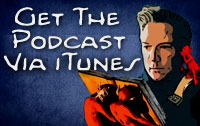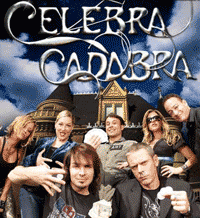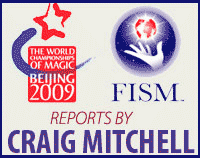Saturday
Jun112011
JONATHAN PENDRAGON'S SEARCH FOR THE GRAIL :: PART 3
 "Contrariwise, if it was so, it might be; and if it were so, it would be; but as it isnʼt, it ainʼt. Thatʼs logic." [Lewis Carroll]
"Contrariwise, if it was so, it might be; and if it were so, it would be; but as it isnʼt, it ainʼt. Thatʼs logic." [Lewis Carroll]
It is hard to believe that in the 16th Century Reginald Scot wrote “The Discoverie of Witchcraft” in order to persuade the public that conjurers were not actually in league with the devil. In the 21st Century, the number of audience members who might believe the magician has unnatural powers has greatly diminished. However, in mentalism, there is still an audience that is willing to believe. Let us call this phenomenon the “what if” principle: what if the performer has real power?
Jim Steinmeyer recently addressed that very issue in the premiere of his one-act play “The Card Trick.” The play recreates an imagined conversation between Houdini and Margery, a famous Boston medium. The major difference between Houdiniʼs career and Margeryʼs was that Houdini never claimed supernatural power, and Margery did. In the play, Houdini condemns her for her fraud, telling her that if she were a magician she would be one of the greatest, but that as a fraud her actions bordered on the criminal.
The conflict that Jim chronicles is not confined to the early 1900s. In the 1970s, James Randi challenged the assertions made by Uri Geller. A cynical view of these debates is one of co-dependent enablers; in this case, the drug is fame. Both magician and “psychic” gain from the notoriety—a view that is scathingly addressed in Jimʼs play. ! The irony—never lost on magicians—is that both sides are doing the same tricks, using the same methods. The only difference is the label, and the questionable ethics of the “psychic” omitting the theatrical equivalent of the Surgeon Generalʼs warning.
Contemporary mentalists grapple with this ethical dilemma, inherent in the system (“Help! Help! Iʼm being oppressed... by the dilemma inherent in the system!”). And there are performers who feel oppressed by the need to be painfully honest inside a paradigm that is so obviously theatrical.
I have never liked tortured disclaimers, which to me seem to undermine the impact of the performance. Contrariwise, remaining silent opens you up to the heartbreak of confronting a desperate believer, who wants you to help them in their time of need, even to the level of a parentʼs plea for help in finding a missing child. Believe me, itʼs happened.
So the problem in how to define a mentalism performance involves more than ethics. It demands an emotional honesty. How do you convince an audience without stepping over the line? How do you create a believable character without putting yourself in the emotional line of fire?
My study of mentalism began at age 14, mentored by the older and wiser Harry Anderson... who was 15. At this time my OCD was at its most severe. Five years ago I began to develop a new style of mentalism, based not on psychic powers but, rather, on high-functioning savant-like talents. My ethical dilemma: while people with OCD do exhibit enhanced memory and highly detailed thought patterns, we are not savants. Through the use of verisimilitude I avoid the “desperate believer,” but can I claim the ethical high ground?
STAY TUNED .... Jonathan Pendragon
































































































































































































 Print Article
Print Article